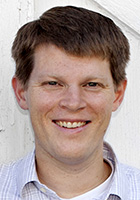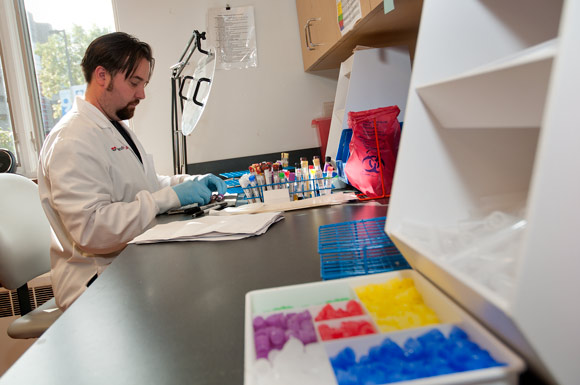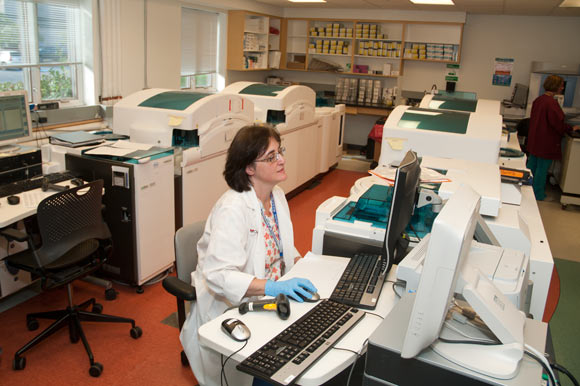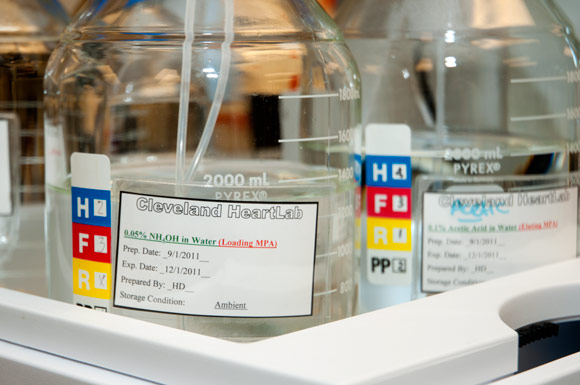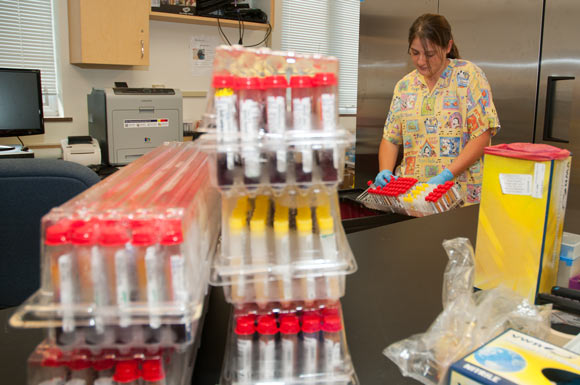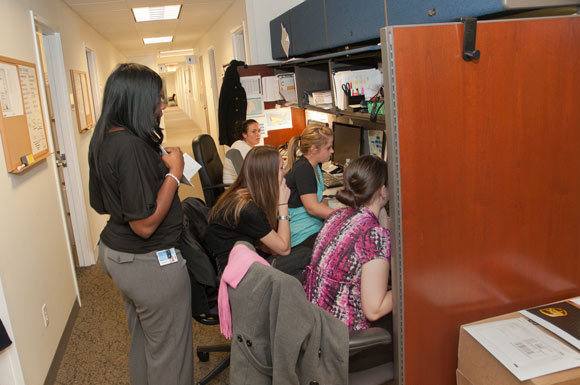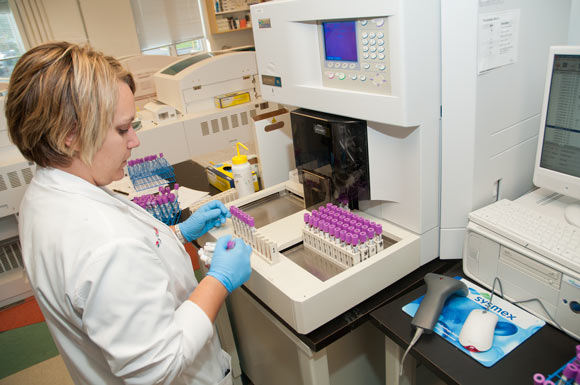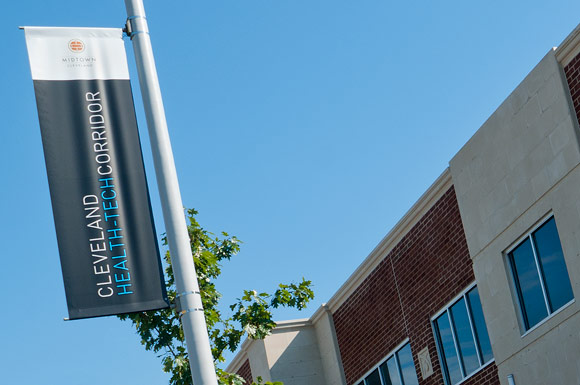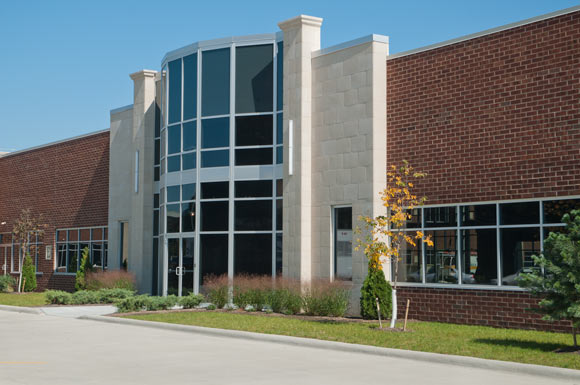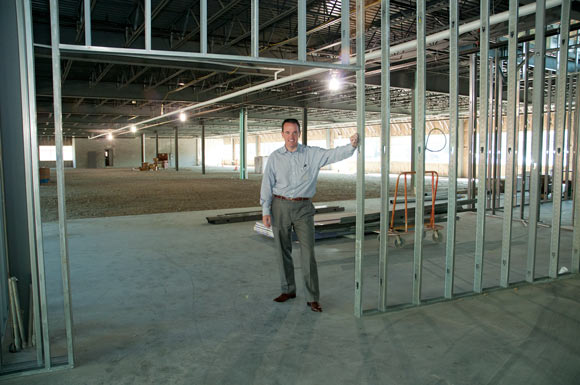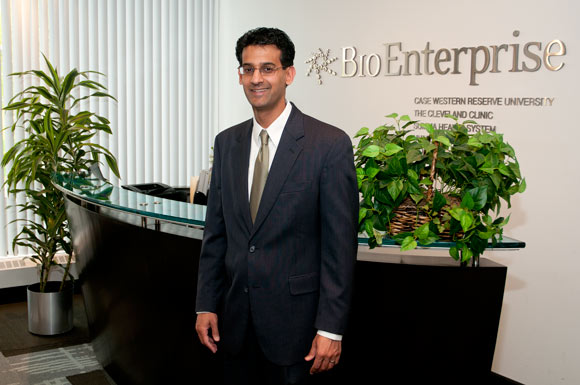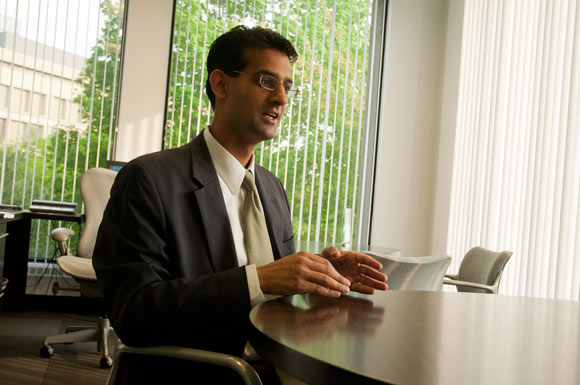midtown tech park and health-tech corridor designed to stem outward flow of medical start-ups
Every year, Cleveland’s growing healthcare economy nourishes dozens of successful start-up companies. Until recently, however, once these firms outgrew their space at the Cleveland Clinic or one of the city’s business incubators, they almost inevitably fled to the suburbs or moved out of the region. That’s because the city lacked the real estate product they needed: flexible, technology-ready office space with room to grow.
But now, thanks to the recent completion of the 128,000-square-foot MidTown Tech Park on Euclid Avenue, start-ups that once left for the ‘burbs have good reason to stick around. Last month, Hemingway Development, which built the MidTown Tech Park on a former used car lot on a spec, inked a 10-year deal to lease 27,000 square feet to Cleveland HeartLab. The fast-growing start-up, which has swelled from eight to 80 employees in just two years, plans to move in next month.
This recent good news, leaders say, signals that the decades-old plan to transform the area into a hub for healthcare and technology companies is finally coming to fruition.
Reversing the Flow
“We knew there was pent-up demand for new real estate, and we wanted to create the square footage to keep companies here,” says Fred Geis, a partner in Hemingway Development and co-owner of the Geis Companies, a developer that, until recently, developed suburban office parks that lured start-ups away from the city.
“We have a lot of interest, and I believe we’ll be full in 90 days,” says Terry Coyne, a real estate broker that represents the Midtown Tech Park and whose family has invested in the project. “Healthcare is the new economic identity for our region.”
The MidTown Tech Park is situated in the heart of the Health-Tech Corridor, a three-mile stretch between downtown and University Circle that is designed to attract healthcare technology companies. With its proximity to major institutions and a growing roster of over 100 biomedical and technology companies -- to mention easy access to RTA’s Healthline -- promoters say the area enjoys a unique competitive advantage.
It goes without saying that healthcare is a bright spot in Northeast Ohio’s partly-cloudy economy. Yet for years, Cleveland has lost successful start-ups to the suburbs, stymieing plans to create a dense industry cluster and redevelop vacant land on Euclid Avenue. The Health-Tech Corridor is an attempt to foster an industry hub on par with U.S. regions like Raleigh-Durham, yet scarcity of real estate put that goal frustratingly out of reach.
Now, with the completion of the MidTown Tech Park and other projects on the horizon, civic leaders say that the Health-Tech Corridor’s moment has arrived.
“When you add up the square footage either built or under construction here, we’ve built and leased our first horizontal skyscraper,” says Baiju Shaw, Executive Director of BioEnterprise, a nonprofit whose mission is to nurture start-up biomedical companies in Cleveland. “Cleveland’s healthcare technology sector is as vibrant as North Carolina’s Research Triangle, and now we’re setting our sights on even higher targets.”
Marriage of Product and Innovation
The seeds for the Health-Tech Corridor were first planted decades ago when civic leaders began plotting a turnaround for then-battered Euclid Avenue.
The first step in that plan was completed in October 2008, when the $197-million Euclid Corridor Project was unveiled. Developers already had begun venturing into the area, most notably with the renovation of the Baker Electric Building and the opening of the MidTown Innovation Center. MidTown Cleveland Inc., the area’s community development corporation, then turned its attention to business-attraction efforts, joining BioEnterprise to create the Health-Tech Corridor.
These two groups’ laser-focused efforts helped land the critical designations as Cuyahoga County Innovation Zone and State of Ohio Hub of Innovation and Opportunity. These new monikers came with coveted loans and grants to help redevelop urban properties on Euclid into modern, competitive real estate.
“It says this is a special geography and the state, county and city will dedicate resources to it,” says Jeff Pesler, Director of Real Estate Development for MidTown Cleveland Inc.
After the designations were awarded, Hemingway Development landed a $3.5 million Job Ready Sites grant, adds Jim Haviland, Executive Director of MidTown. “We were able to marry the business, real estate product and funders and bring it all together.”
After cobbling together a layered package of loans, grants and tax credits, Hemingway broke ground on the Tech Park eight months ago without a single tenant in hand.
“We knew there was interest and we’d have to build it first,” explains Geis. “These are fast-growing companies that can’t wait two years for a real estate project to be built.”
As the Tech Park began to take shape on a checkered, half-empty stretch of Euclid, it soon attracted JumpStart, an economic development nonprofit, as its first tenant.
“When you think of Euclid Avenue, you think of the people that lived on Millionaire’s Row and made their money from entrepreneurialism,” says John Dearborn, President of Jumpstart, which occupies 9,000 square feet of new, loft-style office space in the MidTown Tech Park. “This is about the rebirth of MidTown’s entrepreneurialism.”
Build It, and They Will Come
Jake Orville, President and CEO of Cleveland HeartLab, says the company might not have stayed in Cleveland -- nor the region -- without the Health-Tech Corridor.
“It was very difficult to find the kind of office space that we were looking for in Cleveland,” Orville explains. “We looked all over the region, from Valleyview to Mentor. We also had a potential exit opportunity in Boston, and that was a tough moment for us.”
Ultimately, Orville says his company decided to stay in Cleveland because of the promising growth in healthcare that is taking place here. “You have the same hotbed of innovation as Boston, but without the rat race,” says Orville, who moved to Cleveland from Madison, Wisconsin, after running another successful start-up company.
Since launching two years ago, Cleveland HeartLab, a niche lab that provides proprietary tests for cardiac inflammation, has ballooned from a single room housing a handful of employees to filling a 7,000-square-foot building owned by the Cleveland Clinic.
Every day, a UPS truck arrives at 8 a.m., and workers unload more than 300 boxes of blood samples to be tested in the company’s labs. And that's just the beginning: The FedEx truck arrives at 9 a.m. and another UPS truck comes at 10 a.m.
“We started out looking for 10,000 square feet, but then we’d grow and our needs would change again,” says Orville. Until the big move, the firm’s 80 employees are doubled up in offices, working out of converted closets and taking sales calls in hallways at their existing location.
Orville says that the company’s first choice was always to remain in Cleveland. “We’re Cleveland HeartLab,” he says. “We belong here, and we stayed here. The boxes that we ship across the country have our name -- that’s part of rebranding the city.”
He was motivated to move across the country by the firm’s urgently needed product. Cleveland HeartLab’s tests, which are sold to primary care doctors across the country for “secondary prevention,” measure risk for cardiac events like heart attacks.
“We’ve spent the past 30 years focusing on the cholesterol side of the problem, yet half of the patients that have heart attacks have good cholesterol levels,” explains Marc Penn, Medical Director for Cleveland HeartLab. “Our panel of inflammatory markers measure increased risk and tell patients where they are on that spectrum.”
Orville says that Cleveland HeartLab’s upcoming move to the MidTown Tech Park will help the company to meet demand in the heart of Cleveland. “The best part of the building is we can continue to grow there, because there’s room to expand.”
Placemaking
The MidTown Tech Park is a model for how real estate development can nurture healthcare technology start-ups in Cleveland, Geis says. Yet to be successful, developers must do more than invest in one building; they must create a sense of place.
“You need a larger project with a vision, something that’s similar to a suburban office park or industrial park but in the city of Cleveland,” he says. “You’ve got $1 billion worth of investment in the Health-Tech Corridor now, and we’re creating an industry here.”
Hemingway’s next project is to renovate a building at 7000 Euclid. Geis says he’ll have the building shell completed within 45 days, and he’s already getting calls from prospective tenants. Firms are recognizing that the proximity to urban amenities and the authenticity of the city are key to attracting smart, young professionals, he says.
“They know they can’t attract 20-somethings as easily to Solon,” he says. “Here you have an urban setting, and people are buying into the vision for Euclid Avenue.”
As for the depth of the market and its potential to absorb new real estate, developers appear confident that it's far from saturated. “This area is becoming viewed as a hub, and the square footage being absorbed by new tech companies each year is increasing,” says Dick Pace, a developer who in 2007 renovated the Baker Electric Company building. “What we have to do now is keep providing space so tenants choose us first.”
Pace, whose building is fully leased, now is negotiating to purchase 6611 Euclid, a historic building owned by RTA that he hopes to renovate within the next few years.
The confidence in the market felt by these developers is supported by a study completed in 2008 by Team NEO, a nonprofit group whose mission is to attract companies to Greater Cleveland. According to that analysis, the healthcare industry in Northeast Ohio grew at an annual clip of 7.4 percent from 2003 to 2008, faster than the national average of 6 percent.
Geis’ decision three years ago to refocus a large part of his business on urban development is more than just paying penance, he says – it offers a huge potential upside as the market grows.
“Urban redevelopment is the wave of the future, and we’re trying to stay in front of it,” says the builder, who is already eyeing other projects in MidTown. “In the end, the suburbs will only do as well as the urban core.”
Photos Bob Perkoski
Images 1 - 7 Cleveland HeartLab
Images 8 & 9: The MidTown Tech Park
Image 10: Terry Coyne of Grubb & Ellis at the future HeartLab facility in The MidTown Tech Park
Images 11 & 12: Baiju Shaw, Executive Director of BioEnterprise
